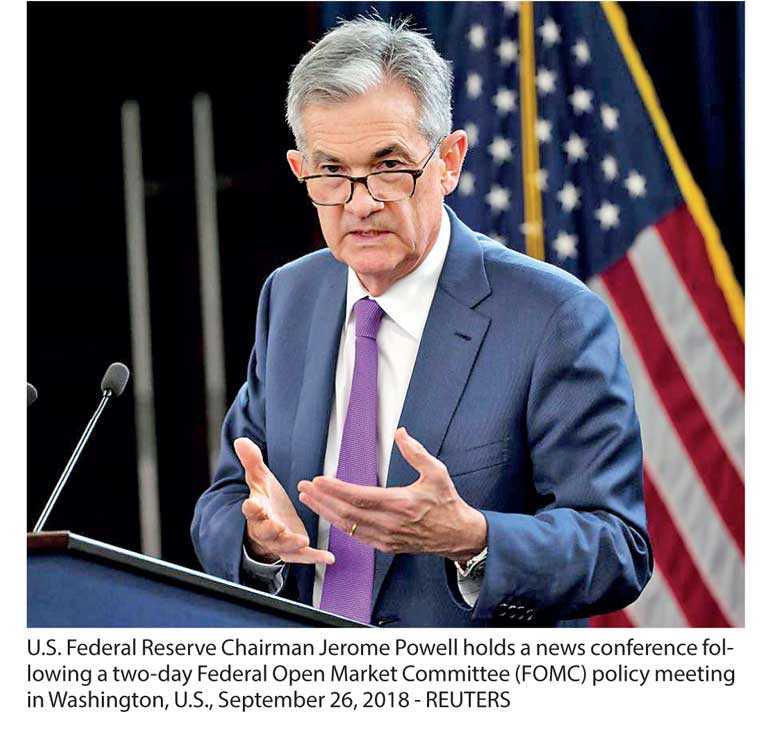Monday Feb 23, 2026
Monday Feb 23, 2026
Friday, 28 September 2018 00:00 - - {{hitsCtrl.values.hits}}
 WASHINGTON (Reuters): The US Federal Reserve raised interest rates on Wednesday and left intact its plans to steadily tighten monetary policy, as it forecast that the US economy would enjoy at least three more years of growth.
WASHINGTON (Reuters): The US Federal Reserve raised interest rates on Wednesday and left intact its plans to steadily tighten monetary policy, as it forecast that the US economy would enjoy at least three more years of growth.
In a statement that marked the end of the era of “accommodative” monetary policy, Fed policymakers lifted the benchmark overnight lending rate by a quarter of a percentage point to a range of 2.00% to 2.25%.
The US central bank still foresees another rate hike in December, three more next year, and one increase in 2020.
That would put the benchmark overnight lending rate at 3.4%, roughly half a percentage point above the Fed’s estimated “neutral” rate of interest, at which rates neither stimulate nor restrict the economy.
That tight policy stance is projected to stay level through 2021, the timeframe of the Fed’s latest economic projections.
“The thing that folks were watching for, which they went ahead and did, was remove the word ‘accommodative’ in regard to their monetary policy,” said State Street Global Advisors Chief Investment Strategist Michael Arone.
“It does seem to potentially indicate they believe monetary policy is becoming less accommodative and getting more towards that neutral rate.” Fed Chairman Jerome Powell said the removal of the wording, which had been a staple of the central bank’s guidance for financial markets and households for much of the past decade, did not signal a policy outlook change. “Instead, it is a sign that policy is proceeding in line with our expectations,” Powell, who took over as head of the Fed earlier this year, said in a press conference after the release of the statement.
The US Treasury yield curve flattened and the US dollar briefly weakened against a basket of currencies. US stocks initially extended gains but fell later in the trading session, with bank and financial stocks getting hit hard. The Fed sees the economy growing at a faster-than-expected 3.1% this year and continuing to expand moderately for at least three more years, amid sustained low unemployment and stable inflation near its 2% target. “The labour market has continued to strengthen ... economic activity has been rising at a strong rate,” it said in its statement.
The Fed inserted no substitute language for the dropped ‘accommodative’ wording in its statement. That wording had become less and less accurate since the central bank began increasing rates in late 2015 from a near-zero level, and its removal means the Fed now considers rates near neutral. Wednesday’s rate increase once again drew criticism from President Donald Trump, who has complained that the Fed’s actions are countering his efforts to boost the economy. “We’re doing great as a country. Unfortunately they just raised interest rates because we are doing so well. I’m not happy about that,” Trump told a press conference on the sidelines of the United Nations General Assembly in New York.
“I’d rather pay down debt or do other things, create more jobs. So I’m worried about the fact that they seem to like raising interest rates.”
Powell, at his press conference, declined to say whether Fed policymakers had discussed Trump’s previous criticism of the central bank. Last month, Trump expressed his displeasure about rising rates and said the Fed should do more to boost the economy.
Powell, who was appointed by Trump and took over as Fed chairman earlier this year, said the central bank would remain independent.
“We don’t consider political factors or things like that,” the Fed chief said.
Wednesday’s rate hike was the third this year and the seventh in the last eight quarters. Ahead of Wednesday’s statement, traders put the chance of a rate increase at 95%, according to CME Group.
The Fed’s latest projections show the economy continuing at a steady pace through 2019, with gross domestic product growth seen at 2.5% next year before slowing to 2.0% in 2020 and to 1.8% in 2021, as the impact of recent tax cuts and government spending fade.
Inflation was forecast to hover near 2% over the next three years, while the unemployment rate is expected to fall to 3.5% next year and remain there through 2020 before rising slightly in 2021.
The jobless rate is currently 3.9%.
With risks described as roughly balanced, the statement left the Fed on a steady course for the next year.
Risks to the current run of economic growth, such as the threat of a damaging round of global tariff increases, were largely set aside.
There were no dissents in the Fed’s policy statement.
NEW YORK (Reuters): President Donald Trump on Wednesday said he was not happy about the Federal Reserve’s decision earlier in the day to raise its benchmark interest rate, but added the increase was a result of a strong economy.
“We’re doing great as a country. Unfortunately they just raised interest rates because we are doing so well. I’m not happy about that,” Trump told a press conference. “I’d rather pay down debt or do other things, create more jobs. So I’m worried about the fact that they seem to like raising interest rates.”
The US Federal Reserve raised interest rates on Wednesday and left intact its plans to steadily tighten monetary policy, as it forecast that the US economy would enjoy at least three more years of growth.